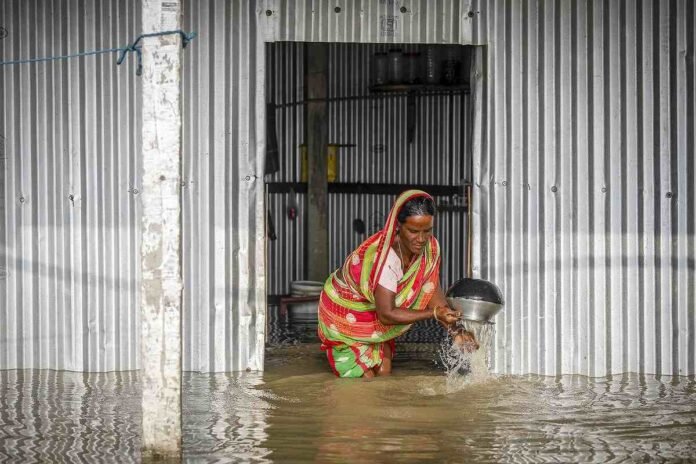Monuwara Begum cleans utensils before leaving her family’s submerged home in Sandahkhaiti, a floating island village on the Brahmaputra River in Morigaon district, Assam, India, on August 30, 2023.
11:47 JST, May 30, 2024
MORIGAON, India (AP) — Yaad Ali fears the arrival of the rainy season this year.
The 56-year-old farmer from the state of Assam in northeastern India lives with his wife and son on the island of Sandahkhaiti on the Indian Brahmaputra River. The island, like 2,000 other islands in the river, is experiencing increasingly severe and unpredictable flooding as human-induced climate change makes rainfall in the region heavier and more erratic.
The family leaves during every flood and returns to their home every dry season. Ali said politicians in the region have made promises to help them, including during the current elections, but little has changed for his family. For the time being, they have to deal with the fact that they are displaced for a large part of the year.
“We need some kind of permanent solution,” Ali said. “In recent years, it is only a short time after we recover from flood damage that we need to be ready to deal with another flood.”
A permanent piece of land in a safer region of the state may be the only solution to their problems, he said. And while local governments have talked about it, only some River Islanders have been granted land rights in the state.
When The Associated Press met Ali and his family last year, they were moving because of persistent rain that had flooded their island home. Now, during the dry season, Ali and his family grow red chili peppers, corn and a few other vegetables on their small farm on the island.
Like most other islanders, agriculture is their livelihood: an estimated 240,000 people in the state’s Morigaon district – where some of the river islands known as Chars are located – depend on fishing and selling products such as rice , jute and vegetables from the state. their small farms.
When it rains, the family stays in their small hut in knee-deep water for as long as possible, sometimes for days. Cooking, eating and sleeping, even when the river water rises. But sometimes the water floods their house, forcing them to flee with their belongings.
“We are leaving everything behind and trying to find higher ground or move to the nearest relief camp,” Monuwara Begum, Ali’s wife, said last year. The relief camps are unsanitary and there is never enough space or food, Ali said, and “sometimes we only get rice and salt for days.”
But when it is dry, the family has a temporary reprieve. They move back to their homes, tend their farms and are able to make a living by selling the produce they harvest.
India, and the state of Assam in particular, is considered one of the most vulnerable regions in the world to climate change due to increased rainfall and flooding, according to a 2021 report by the Council on Energy, Environment and Water, a climate organization based in New Delhi. thinktank.
Like many families on the Chars, Ali and his family cannot afford to move permanently, and have reconciled themselves to their fate of moving back and forth to their home.
“Nobody cares about our problems,” Ali said. “All political parties promise to solve the flooding problems, but after the elections no one is concerned about that.
“We have to make it out of here somehow,” he said.



